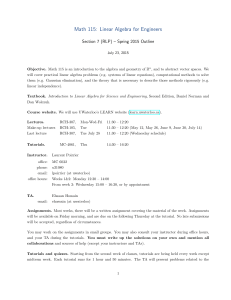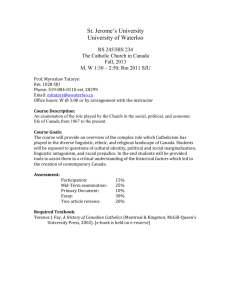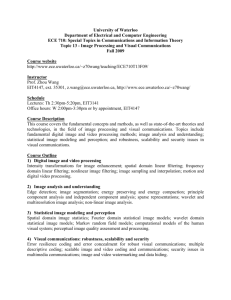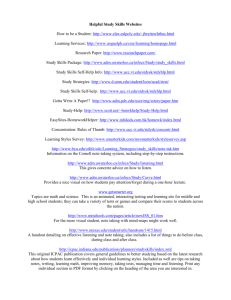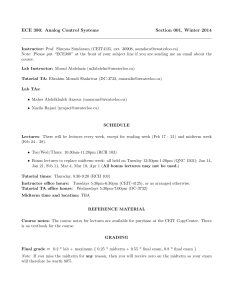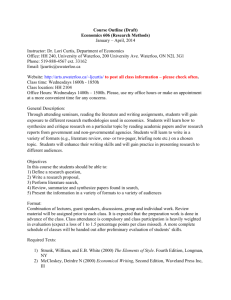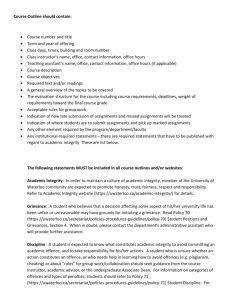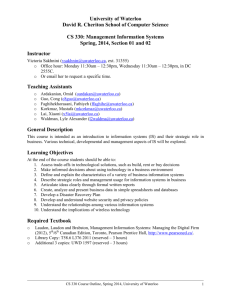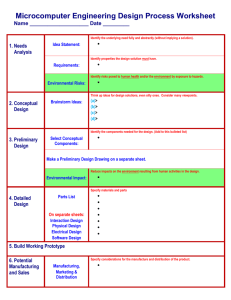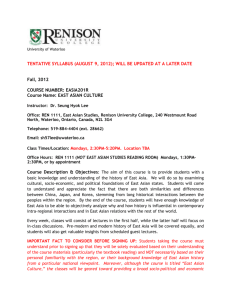ISS 150R - (2) - University of Waterloo
advertisement
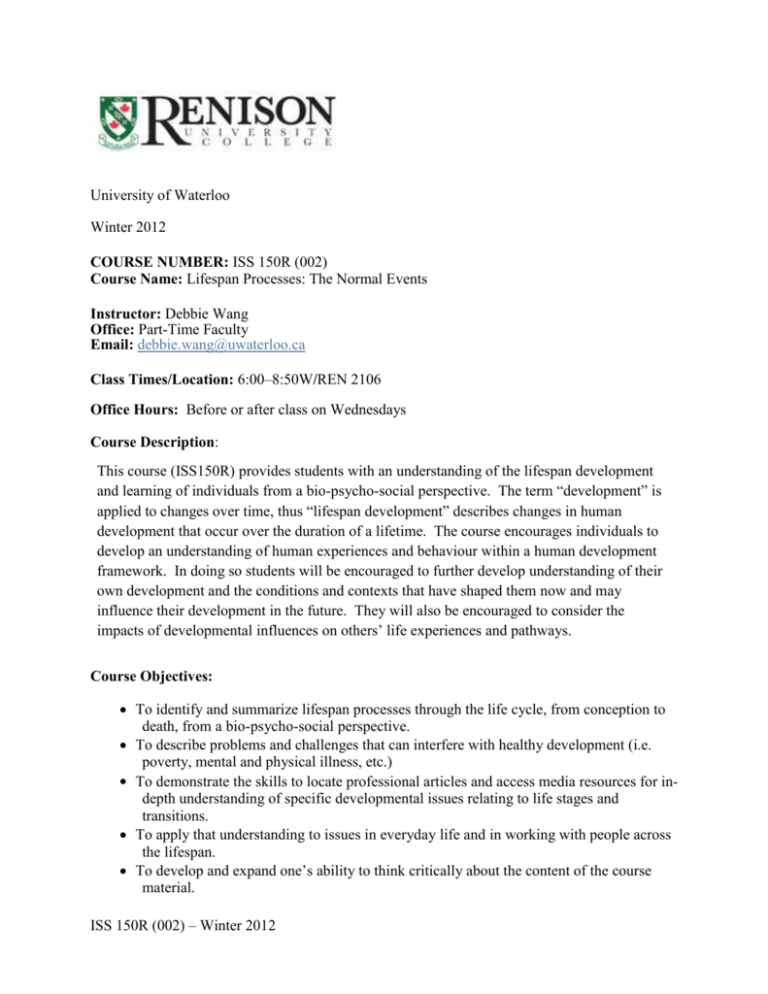
University of Waterloo Winter 2012 COURSE NUMBER: ISS 150R (002) Course Name: Lifespan Processes: The Normal Events Instructor: Debbie Wang Office: Part-Time Faculty Email: debbie.wang@uwaterloo.ca Class Times/Location: 6:00–8:50W/REN 2106 Office Hours: Before or after class on Wednesdays Course Description: This course (ISS150R) provides students with an understanding of the lifespan development and learning of individuals from a bio-psycho-social perspective. The term “development” is applied to changes over time, thus “lifespan development” describes changes in human development that occur over the duration of a lifetime. The course encourages individuals to develop an understanding of human experiences and behaviour within a human development framework. In doing so students will be encouraged to further develop understanding of their own development and the conditions and contexts that have shaped them now and may influence their development in the future. They will also be encouraged to consider the impacts of developmental influences on others’ life experiences and pathways. Course Objectives: To identify and summarize lifespan processes through the life cycle, from conception to death, from a bio-psycho-social perspective. To describe problems and challenges that can interfere with healthy development (i.e. poverty, mental and physical illness, etc.) To demonstrate the skills to locate professional articles and access media resources for indepth understanding of specific developmental issues relating to life stages and transitions. To apply that understanding to issues in everyday life and in working with people across the lifespan. To develop and expand one’s ability to think critically about the content of the course material. ISS 150R (002) – Winter 2012 Textbook: Boyd, D., Bee, H. & Johnson, P. (2012) Lifespan Development 4th Canadian Ed., Pearson. Any additional required readings will be assigned during class time and will be available on reserve at Renison Library. Course Requirements Midterm Exam (25%) The midterm exam covers the content of chapters 1-10. Students will be required to answer multiple choice / true & false questions as well as being given a choice of short answer/essay questions to answer (which will be given in advance, one class prior to the exam). Term Paper (30%) Each student will be required to write an essay (complete with an introduction & overview, discussion, conclusion, and bibliography) introducing a topic, identifying concerns or problems, and demonstrating the effects or adjustments of the person for his/her life course. Students may choose specific topics from the general areas of parent-child relationship, school experiences, mating, career, mental health, death and dying, etc. Use different developmental theories studied in this course to examine the effect of problems on normal development. Students must clear their topics with the instructor. Appropriate resources: Students are required to use academic books and journal articles (within the last 10 years) with a minimum of 8 sources. Two of those sources may be from magazines, newspapers or websites (as long as they are from recognized educational sites, not from a private home page). The paper should have a title page, typed, double-spaced, and approx. 2000-2500 words (about 10 pages), using American Psychological Association (APA) or Modern Language Association (MLA) format with proper citations and references. Organization and clarity of thought as well as proper grammar and spelling are expected. Simply staple the pages together – no folders please. Final Exam (35%) The final exam covers the content of chapters 11-19 and life stress management. Students will be required to answer multiple choice questions as well as being given a choice of essay questions to answer. The essay questions will be given in advance and students will write the exam during the regularly scheduled exam period and be notified of the time and date later in the term. ISS 150R (002) – Winter 2012 Class Participation & Reflection of Learning (10%) Students are expected to prepare for class by reading the required materials and reflecting on this material in relation to their own experiences. In class, students are expected to contribute to group learning by being present and engaged in the discussion and by sharing their ideas, reflections, questions, and experiences in a manner that is respectful of others. Grading: Midterm Test Term Paper Final Examination Participation & Reflection Date: February 8 Date: March 21* Date: Exam Period Ongoing Value: 25% Value: 30% Value: 35% Value: 10% * Assignments are to be handed in at the beginning of class on the due date. Late papers will be deducted 5% on the first day and 2% for each subsequent day (including weekend days) for one week, after which the paper will not be accepted. Requests for extensions (with valid reason) must be negotiated prior to the due date, in order to avoid late penalties. SYLLABUS WINTER 2012 The reading assignments are a critical element of this course. You should begin each week by reading from the assigned textbook, the online lecture, and any articles that may be assigned. Week 1 Introduction to the course January 4 Basic concepts and methods Reading: Chapter 1 & Life Stress Management Week 2 Theoretical views of development January 11 Reading: Chapter 2 & 3 Week 3 Prenatal development and birth January 18 Postpartum Mood Disorders Reading: Chapter 4, 5, 6 ISS 150R (002) – Winter 2012 Week 4 Infancy and early childhood January 25 Attachment & bonding, Nipissing Developmental Screen Tool (age 0-6) Reading: Chapter 7, 8 Week 5 Middle childhood February 1 The Big Five Personality Traits, Schooling, bullying, child abuse Reading: Chapter 9, 10 Week 6 Midterm Exam February 8 Research for term paper Week 7 Adolescence: Developmental tasks and crises February 15 Substance abuse, mental & sexual health, self-concept & peer influence Reading: Chapter 11, 12 February 22 Reading Week – No Class Week 8 Early adulthood February 29 Vocational choice, cohabitation, marriage & parenting Reading: Chapter 13, 14 Week 9 Middle adulthood March 7 Family, career, roles, identity and other crises Reading: Chapter 15, 16 Week 10 Late adulthood March 14 Successful aging, retirement, living arrangements Reading: Chapter 17, 18 ISS 150R (002) – Winter 2012 Week 11 Death, dying, and bereavement March 21 Term paper due Reading: Chapter 19 Week 12 Life stress management March 28 Course review and integration Academic Integrity: In order to maintain a culture of academic integrity, members of the University of Waterloo community are expected to promote honesty, trust, fairness, respect and responsibility. Academic Integrity website (Arts): http://arts.uwaterloo.ca/arts/ugrad/academic_responsibility.html Academic Integrity Office (UW): http://uwaterloo.ca/academicintegrity/ Discipline: A student is expected to know what constitutes academic integrity [check www.uwaterloo.ca/academicintegrity/ ] to avoid committing academic offences and to take responsibility for his/her actions. A student who is unsure whether an action constitutes an offence, or who needs help in learning how to avoid offences (e.g., plagiarism, cheating) or about “rules” for group work/collaboration, should seek guidance from the course instructor, academic advisor, or Renison’s Administrative Dean. When misconduct has been found to have occurred, disciplinary penalties will be imposed under Policy 71, Student Discipline. For information on categories of offences and types of penalties, students should refer to this policy www.adm.uwaterloo.ca/infosec/Policies/policy71.htm . For typical penalties check Guidelines for the Assessment of Penalties, www.adm.uwaterloo.ca/infosec/guidelines/penaltyguidelines.htm. Grievance: A student who believes that a decision affecting some aspect of his/her university life has been unfair or unreasonable may have grounds for initiating a grievance. Read Policy 70, Student Petitions and Grievances, Section 4, www.adm.uwaterloo.ca/infosec/Policies/policy70.htm Appeals: A student may appeal the finding and/or penalty in a decision made under Policy 70 - Student Petitions and Grievances (other than regarding a petition) or Policy 71 - Student Discipline if grounds for an appeal can be established. Read Policy 72 - Student Appeals www.adm.uwaterloo.ca/infosec/Policies/policy72.htm. Note for students with disabilities: The Office for Persons with Disabilities (OPD), located in Needles Hall, Room 1132, collaborates with all academic departments to arrange appropriate accommodations for students with disabilities without compromising the academic integrity of the curriculum. If you require academic accommodations to lessen the impact of your disability, please register with the OPD at the beginning of each academic term. Final Examination Policy For Winter 2012, the established examination period is April 9 -21, 2012. The schedule will be available in February. Students should be aware that student travel plans are not acceptable grounds for granting an alternative final examination time (see http://www.registrar.uwaterloo.ca/exams/finalexams.html). ISS 150R (002) – Winter 2012
